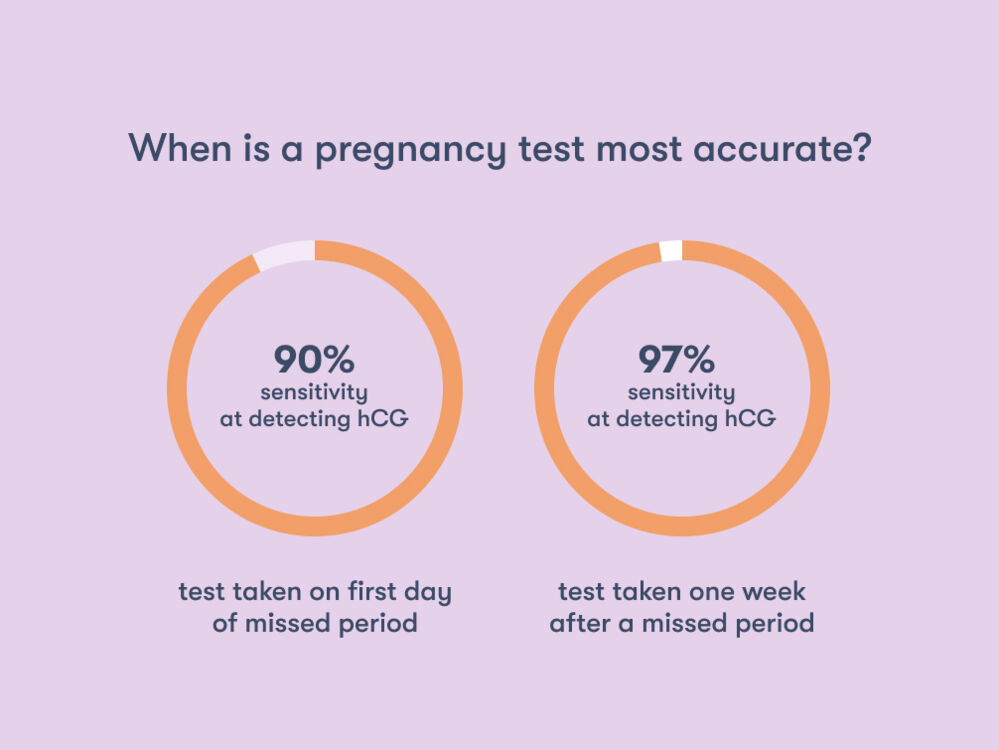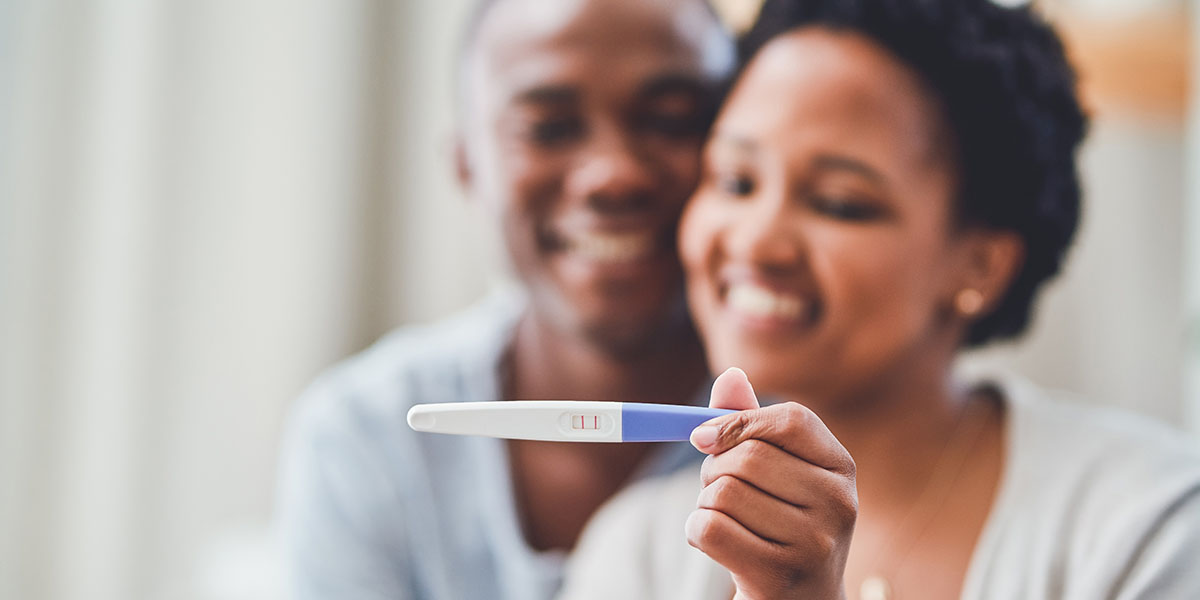But, as a recent press release from Planned Parenthood explains, healthcare professionals typically count weeks of pregnancy by your last period. The first day of your last period marks the beginning of the first week of pregnancy. By the very first day of your missed period, you're already considered 4 weeks pregnant.Pregnant females no longer get their period. But they can have other bleeding that might look like a period. For example, there can be a small amount of bleeding when a fertilized egg implants in the uterus. Called implantation bleeding, this usually happens around the same time a girl would normally get her period.If you don't know the date of your last period or when you conceived, talk to your provider. They will do an exam, which will likely include a prenatal ultrasound, to determine how far along you are in your pregnancy.
Am I pregnant if I missed my period : The most common early signs and symptoms of pregnancy might include: Missed period. If you're in your childbearing years and a week or more has passed without the start of an expected menstrual cycle, you might be pregnant. However, this symptom can be misleading if you have an irregular menstrual cycle.
What are signs of very early pregnancy
The signs of early pregnancy can include:
missed period.
nausea and vomiting (often called 'morning' sickness, but it can occur at any time)
breast tenderness and enlargement.
fatigue.
passing urine more frequently than usual, particularly at night.
What are symptoms of 1 week pregnancy : Most people have no pregnancy symptoms at week 1, while others may experience very early pregnancy symptoms such as fatigue, breast tenderness, and mild cramping within the first 5-6 days after intercourse. Typically, medical professionals measure pregnancy week 1 from the first day of the last menstrual period.
Most people have no pregnancy symptoms at week 1, while others may experience very early pregnancy symptoms such as fatigue, breast tenderness, and mild cramping within the first 5-6 days after intercourse. Typically, medical professionals measure pregnancy week 1 from the first day of the last menstrual period. There's no such thing as a cryptic pregnancy period (a menstrual period during cryptic pregnancy). But you might have implantation bleeding or abnormal pregnancy bleeding and think it's your period. Some other common symptoms you shouldn't ignore are: Sore or swollen breasts.
Can you be 1 week late and not pregnant
Pregnancy is not the only reason for a late or missed period. Other factors include excessive exercise, changes in body weight, and stress. Maybe you are pregnant but tried a pregnancy test too early to confirm the result. If applicable, try testing again 21 days after you had unprotected sex.It's important to keep in mind that your period is considered regular as long as it comes every 24-38 days. However, if your menstrual cycle typically runs like clockwork every month and you've noticed you are over a week late, then it's time to take a pregnancy test or book in with your doctor.Some early symptoms you might notice by week 2 that indicate you're pregnant include:
a missed period.
moodiness.
tender and swollen breasts.
nausea or vomiting.
increased urination.
fatigue.
Things like missing your period, sore or tender breasts, feeling more tired and nausea (morning sickness) are common symptoms of early pregnancy. Some people have symptoms of pregnancy before they miss their period. Take an at-home pregnancy test if you think you might be pregnant.
Can I know if I am pregnant in 7 days : It can take around 3-4 weeks from the first day of your last period for there to be enough hCG in your body to show up on a test. If you take a test too soon, it could show up as a false negative – where the test says you're not pregnant even if you really are.
What are 2 week pregnancy symptoms : Pregnancy symptoms during week 2
Slippery cervical mucus. Cervical mucus is the vaginal discharge you sometimes find in your underwear.
Mild cramping.
Increased sex drive.
Heightened sense of smell.
Tender breasts.
Cervical changes.
A boost in your basal body temperature (BBT)
Is it possible to be 3 months pregnant with a negative test
The hook effect incorrectly gives you a negative result on a pregnancy test. This can happen during early pregnancy or in rare cases — even into the third trimester, when it's pretty clear you're preggers. During pregnancy your body makes a hormone called human chorionic gonadotrophin (hCG). Pregnancy is not the only reason for a late or missed period. Other factors include excessive exercise, changes in body weight, and stress. Maybe you are pregnant but tried a pregnancy test too early to confirm the result. If applicable, try testing again 21 days after you had unprotected sex.It's important to keep in mind that your period is considered regular as long as it comes every 24-38 days. However, if your menstrual cycle typically runs like clockwork every month and you've noticed you are over a week late, then it's time to take a pregnancy test or book in with your doctor.
Can I be 5 days late and not pregnant : While a late period may be indicative of pregnancy, it can also be caused by other internal and external factors such as stress, illness, and taking certain medications. For some women, the regularity of their menstrual cycle fluctuates which means that the arrival of their period may vary from month to month.
Antwort How late can a period be if pregnant? Weitere Antworten – How many weeks am I pregnant after missed period
But, as a recent press release from Planned Parenthood explains, healthcare professionals typically count weeks of pregnancy by your last period. The first day of your last period marks the beginning of the first week of pregnancy. By the very first day of your missed period, you're already considered 4 weeks pregnant.Pregnant females no longer get their period. But they can have other bleeding that might look like a period. For example, there can be a small amount of bleeding when a fertilized egg implants in the uterus. Called implantation bleeding, this usually happens around the same time a girl would normally get her period.If you don't know the date of your last period or when you conceived, talk to your provider. They will do an exam, which will likely include a prenatal ultrasound, to determine how far along you are in your pregnancy.
Am I pregnant if I missed my period : The most common early signs and symptoms of pregnancy might include: Missed period. If you're in your childbearing years and a week or more has passed without the start of an expected menstrual cycle, you might be pregnant. However, this symptom can be misleading if you have an irregular menstrual cycle.
What are signs of very early pregnancy
The signs of early pregnancy can include:
What are symptoms of 1 week pregnancy : Most people have no pregnancy symptoms at week 1, while others may experience very early pregnancy symptoms such as fatigue, breast tenderness, and mild cramping within the first 5-6 days after intercourse. Typically, medical professionals measure pregnancy week 1 from the first day of the last menstrual period.
Most people have no pregnancy symptoms at week 1, while others may experience very early pregnancy symptoms such as fatigue, breast tenderness, and mild cramping within the first 5-6 days after intercourse. Typically, medical professionals measure pregnancy week 1 from the first day of the last menstrual period.

There's no such thing as a cryptic pregnancy period (a menstrual period during cryptic pregnancy). But you might have implantation bleeding or abnormal pregnancy bleeding and think it's your period. Some other common symptoms you shouldn't ignore are: Sore or swollen breasts.
Can you be 1 week late and not pregnant
Pregnancy is not the only reason for a late or missed period. Other factors include excessive exercise, changes in body weight, and stress. Maybe you are pregnant but tried a pregnancy test too early to confirm the result. If applicable, try testing again 21 days after you had unprotected sex.It's important to keep in mind that your period is considered regular as long as it comes every 24-38 days. However, if your menstrual cycle typically runs like clockwork every month and you've noticed you are over a week late, then it's time to take a pregnancy test or book in with your doctor.Some early symptoms you might notice by week 2 that indicate you're pregnant include:
Things like missing your period, sore or tender breasts, feeling more tired and nausea (morning sickness) are common symptoms of early pregnancy. Some people have symptoms of pregnancy before they miss their period. Take an at-home pregnancy test if you think you might be pregnant.
Can I know if I am pregnant in 7 days : It can take around 3-4 weeks from the first day of your last period for there to be enough hCG in your body to show up on a test. If you take a test too soon, it could show up as a false negative – where the test says you're not pregnant even if you really are.
What are 2 week pregnancy symptoms : Pregnancy symptoms during week 2
Is it possible to be 3 months pregnant with a negative test
The hook effect incorrectly gives you a negative result on a pregnancy test. This can happen during early pregnancy or in rare cases — even into the third trimester, when it's pretty clear you're preggers. During pregnancy your body makes a hormone called human chorionic gonadotrophin (hCG).

Pregnancy is not the only reason for a late or missed period. Other factors include excessive exercise, changes in body weight, and stress. Maybe you are pregnant but tried a pregnancy test too early to confirm the result. If applicable, try testing again 21 days after you had unprotected sex.It's important to keep in mind that your period is considered regular as long as it comes every 24-38 days. However, if your menstrual cycle typically runs like clockwork every month and you've noticed you are over a week late, then it's time to take a pregnancy test or book in with your doctor.
Can I be 5 days late and not pregnant : While a late period may be indicative of pregnancy, it can also be caused by other internal and external factors such as stress, illness, and taking certain medications. For some women, the regularity of their menstrual cycle fluctuates which means that the arrival of their period may vary from month to month.